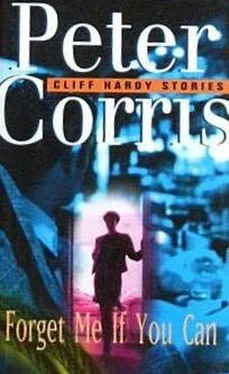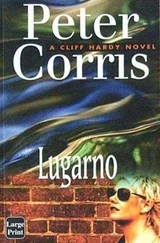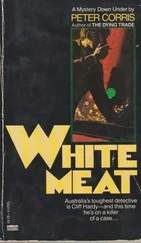Peter Corris - Forget Me If You Can
Здесь есть возможность читать онлайн «Peter Corris - Forget Me If You Can» весь текст электронной книги совершенно бесплатно (целиком полную версию без сокращений). В некоторых случаях можно слушать аудио, скачать через торрент в формате fb2 и присутствует краткое содержание. Жанр: Криминальный детектив, на английском языке. Описание произведения, (предисловие) а так же отзывы посетителей доступны на портале библиотеки ЛибКат.
- Название:Forget Me If You Can
- Автор:
- Жанр:
- Год:неизвестен
- ISBN:нет данных
- Рейтинг книги:5 / 5. Голосов: 1
-
Избранное:Добавить в избранное
- Отзывы:
-
Ваша оценка:
- 100
- 1
- 2
- 3
- 4
- 5
Forget Me If You Can: краткое содержание, описание и аннотация
Предлагаем к чтению аннотацию, описание, краткое содержание или предисловие (зависит от того, что написал сам автор книги «Forget Me If You Can»). Если вы не нашли необходимую информацию о книге — напишите в комментариях, мы постараемся отыскать её.
Forget Me If You Can — читать онлайн бесплатно полную книгу (весь текст) целиком
Ниже представлен текст книги, разбитый по страницам. Система сохранения места последней прочитанной страницы, позволяет с удобством читать онлайн бесплатно книгу «Forget Me If You Can», без необходимости каждый раз заново искать на чём Вы остановились. Поставьте закладку, и сможете в любой момент перейти на страницу, на которой закончили чтение.
Интервал:
Закладка:
The two mercenaries had barely fired a shot in anger before, along with a dozen or so others, they were captured by Cubans fighting for the MPLA. They were given a swift trial for ‘crimes against humanity’. All were found guilty but the sentences were somewhat arbitrary. Trumble got twenty years, North was executed by firing squad. Trumble served three years in some Luandan hellhole and was released after a swap of prisoners was arranged between the contestants in the civil war. While in prison he learned of the birth of his son, David, and the boy and his mother were waiting for Trumble when he finally got home in the Eighties. He was cured of soldiering and settled down to become a manufacturer of barbecues which sold like crazy through the good times of the Eighties.
Trumble had been lucky in Vietnam and Africa, but his luck ran out in 1987 when his wife died suddenly of cancer. They had no other children and David became the focus of his father’s life. Trumble sold his business at a massive profit in 1990 in order to give himself more time to devote to the boy. David shaped up to be a winner-very bright at school, an outstanding athlete, musically talented.
‘I can play the mouth organ a bit,’ Trumble had told me. ‘That’s about it, but David can pick up any musical instrument and get a tune out of it right away.’
To add to all this, Trumble said that he and David got on well. Then he pulled a tortured face. ‘Like mates,’ he said.
That was the problem. As he got older David began to resemble Trumble’s dead mate, Lee North, more and more until by now, at sixteen, he was the spitting image of him. I spread the photographs Trumble had left on the desk. One showed Trumble and North as ten-year-olds, in football kit. They were of similar size and build, but North was dark and had longer, leaner features. Trumble was fair-headed and had the blocky look he still retained. Another snap of them as teenagers, dressed up for a night on the town, emphasised the difference. Trumble had filled out and looked pugnacious; North was slim with an amused, sceptical cast to his face. There were three photographs of David, carefully annotated on the back-at two years, ten years and sixteen. The little boy’s fair hair had turned progressively darker and his initial chubbiness had given way to a wiry slimness and cleanly etched features.
I stared at the pictures for a long time. They weren’t peas in a pod, Lee North and David Trumble. The hairlines were different, and North’s ears stuck out a bit whereas David’s were standard issue. But the resemblance was startlingly close.
How the hell was I to set about this? Trumble had provided birth certificates for himself, Lee North and the son he suspected was not his son. Sean Trumble, son of Eric and May, nee Douglas; Lee North, son of Percy and Rose, nee Valletta; David Trumble, son of Sean and Clara, nee Moon. Trumble’s parents were both dead and he had been an only child. Rose North was alive at the age of seventy-seven, having survived her husband by ten years. Lee North had a brother, Peter, and a sister, Maria. Trumble had provided addresses in Sydney for both but said he hadn’t spoken to either for many years.
There were two more photographs. One a conventional studio-style portrait of Sean and Clara in their wedding outfits. He looked uncomfortable in the slightly too tight tuxedo, she cool and elegant in a white lace dress with her veil pushed back. She was a very attractive young woman with light hair and skin. There was a frailty about her, but that may have been my imagination, working backwards from the knowledge that she had died very young. The other picture was the one that must have given Trumble nightmares since his suspicions were aroused. It showed his bride in the arms of the best man. You could read it either way-a high-spirited kiss on an emotional day, or a passionate embrace that had nothing to do with the occasion.
One of the great advantages of working for yourself is that you can choose how hard you want to work, how long and how little. I decided that I would do no more than go through the motions for Sean Trumble. It was highly unlikely that I’d be able to find anything out anyway and, I told myself, Trumble probably didn’t want to know anything, not really. The more I thought about it the more I convinced myself that he’d be satisfied with a non-result-nothing proven, forget it.
I cooked up a thin cover story in my head and dialled the number he’d given me for Mrs Rose North.
‘Carlingford Nursing Home.’
That was a surprise. ‘Ah, my name is Hardy. I’m a journalist. Do you have a Mrs Rose North with you there?’
‘Yes we do, Mr Hardy.’
‘Would it be possible for me to speak to her? I…’
‘Oh, would you?’ The woman at the other end of the phone sounded as if I’d offered her a holiday in Bali. ‘Mrs North is a most interesting woman, but very lonely. She seldom gets any visitors and that’s such a pity because her mind is very active and… What would you want to talk to her about, Mr Hardy?’
‘Her late son. I’m writing about the Angolan civil war. He fought there you see.’
‘Fascinating. I’m sure Rose would love to talk to you. When would you like to come?’
‘Where are you exactly? And who am I talking to, please?’
‘I’m sorry. My name is Mrs Saunders, I’m the supervisor here. We’re in Carlingford Road, Epping.’
It was three-thirty and I had nothing pressing on hand. It would take me forty-five minutes to get there, half an hour with the old dear, back in the city by five-thirty, just in time for the first drink of the day. ‘How about today, Mrs Saunders, within the hour?’
‘Wonderful. I’ll send someone to tell her you’re coming and get her tidied up. She’ll be thrilled. Just drive in the gates. There’s plenty of parking space.’
The nursing home was a Victorian mansion set in big grounds dominated by large trees. The early April afternoon was breezy and leaves were blowing over the gravel drive and the lawn and the flower beds. An old man was raking the leaves into piles and watching while the wind blew them away again. He didn’t seem to mind. I parked to one side of the building and walked up a set of deeply worn brick steps onto a wide verandah that swept around the whole structure. A gap had been made in the waist-high wall around the verandah and a ramp built down to ground level. There was another ramp beside the steps that led into a small lobby. I pushed open the door, stepped inside and was greeted by a woman who’d evidently been waiting for me.
‘You must be Mr Hardy? I’m Mavis Saunders.’ She was a stout, motherly type in a blue dress vaguely reminiscent of a nurse’s uniform with a white cardigan draped around her shoulders. We shook hands and she led me up the stairs and down a corridor to a corner room. She pushed the door open and beckoned me in.
An old woman was sitting in a cane chair near the open window. The room smelled of flowers and medicines and tobacco. The woman was smoking a cigarette held in a long holder. She looked up at me with beautiful dark eyes sunk deep in a sallow, lined face and took a deep drag.
‘Rose is a terror,’ Mavis Saunders said. ‘We cannot stop her smoking no matter what we do, so we allow her to have two or three each day as long as she sits by the window and blows the smoke outside.’
Rose North blew the smoke at Mrs Saunders.
‘Rose!’
The old woman grinned and I couldn’t help grinning back. Mrs Saunders plumped a cushion behind the old woman’s back and pointed to a chair I could bring closer to the window. ‘She’s a little deaf but there’s nothing wrong with her brainbox, is there, Rose?’
‘No.’
There was the hint of an accent even in that one syllable, along with a considerable amount of authority. Mavis Saunders stopped fussing as if she’d been reprimanded. ‘Well, I’ll just leave you with her. About half an hour, Mr Hardy.’
Читать дальшеИнтервал:
Закладка:
Похожие книги на «Forget Me If You Can»
Представляем Вашему вниманию похожие книги на «Forget Me If You Can» списком для выбора. Мы отобрали схожую по названию и смыслу литературу в надежде предоставить читателям больше вариантов отыскать новые, интересные, ещё непрочитанные произведения.
Обсуждение, отзывы о книге «Forget Me If You Can» и просто собственные мнения читателей. Оставьте ваши комментарии, напишите, что Вы думаете о произведении, его смысле или главных героях. Укажите что конкретно понравилось, а что нет, и почему Вы так считаете.










